英语:特殊句式-倒装句
英语特殊句式-倒装句,省略句,强调句
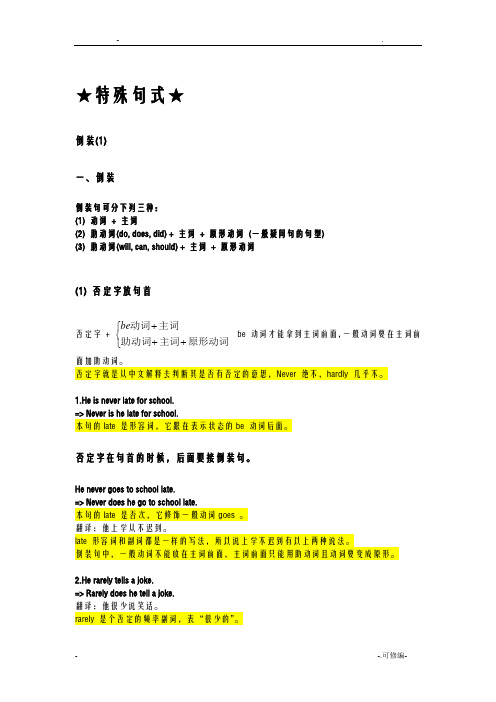
★特殊句式★倒装(1)一、倒装倒装句可分下列三种:(1) 动词 + 主词(2) 助动词(do, does, did) + 主词 + 原形动词 (一般疑问句的句型)(3) 助动词(will, can, should) + 主词 + 原形动词(1) 否定字放句首否定字 + ⎩⎨⎧+++原形动词主词助动词主词动词be be 动词才能拿到主词前面,一般动词要在主词前面加助动词。
否定字就是从中文解释去判断其是否有否定的意思,Never 绝不,hardly 几乎不。
1.He is never late for school.=> Never is he late for school.本句的late 是形容词,它跟在表示状态的be 动词后面。
否定字在句首的时候,后面要接倒装句。
He never goes to school late.=> Never does he go to school late.本句的late 是否次,它修饰一般动词goes 。
翻译:他上学从不迟到。
late 形容词和副词都是一样的写法,所以说上学不迟到有以上两种说法。
倒装句中,一般动词不能放在主词前面,主词前面只能用助动词且动词要变成原形。
2.He rarely tells a joke.=> Rarely does he tell a joke.翻译:他很少说笑话。
rarely 是个否定的频率副词,表“很少的”。
3.I have never seen such beautiful scenery.=> Never have I seen such beautiful scenery.翻译:我从来没有看到过如此美丽的景象。
have 在这里就是一个助动词,景象不可数不能在其前面加不定冠词a 或定冠词the 。
4.I had hardly sat in the chair when someone knocked at the door.hardly~when~ = scarcely~before~,表示“几乎不…”翻译:我一刚要坐着椅子上就有人来敲门了。
高中英语倒装句等特殊句式讲义以及练习题(高考总复习,纯干货,原创)

第一个我们来学习倒装句,倒装属于单选常考的知识点,而且也是写作中的较高级句式了。
一、倒装:完全倒装、部分倒装、形式倒装(假倒装)***倒装句口诀:地点全倒装,son也虚假关于完全倒装“地点全倒装”的意思是:句子中将表示地点、时间等方位位置或者时间的副词、介词等词提前时,句子要全部倒装。
全部倒装的句式结构:地点+谓语+主语。
1.表示地点方位位置的副词、介词,运动方位的副词(under,there,here,out,in,up,down,away,near,opposite……)、时间的副词(now,then)位于句首时, 句子要全部倒装。
A girl sits under the tree倒装后变为Under the tree sits a girl.注意完全倒装中,代词做主语不倒装.如果说这句话是代词做主语:She sits under the tree.那么即使是将描述地点的介词提前,这句话也不倒装,而是变为Under the tree she sits.练习题(1)A bus comes here.= _______________________________________________________ 练习题(2)Your turn comes now.= ____________________________________________________Here/there句型用一般现在时,代词做主语不倒装;Here you are. Here it is.关于部分倒装口诀的下半句中“S on也虚”对应部分倒装,我们来看一下部分倒装的结构。
部分倒装的句式结构:就是将部分倒装标志词提前以后,句子变为一般疑问句语序。
即:标志词+助动词/be动词/情态动词+主语+其他……S:So/such……that……(注意:“主倒从不倒”,也就是说是so/such所在的主句倒装,that后的从句不用倒),看例句:He speaks English so clearly that he can always make himself understood.=so是标志词,所以so clearly这个意群提前(举个例子来说意群:一辆出租车来了=来了一辆出租车,其中“一辆出租车”这几个字不能拆分,它就是一个意群),然后再将主句调整为上边说的部分倒装句式结构。
特殊句式(倒装句)
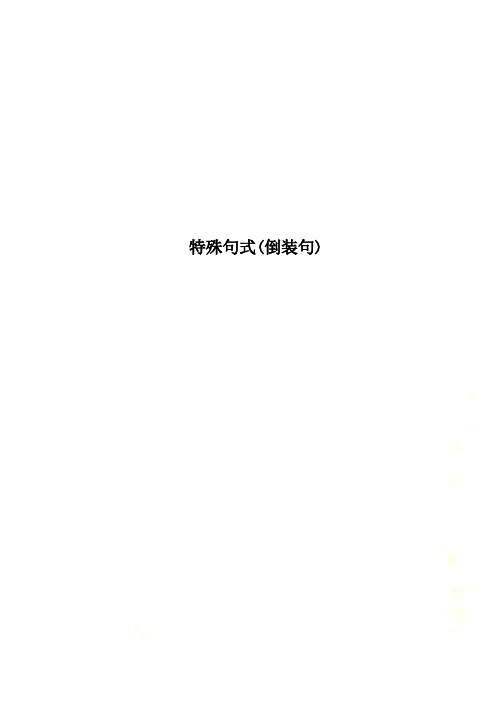
特殊句式(倒装句)高考英语语法复习专题------ 特殊句式一、考点聚焦倒装句部分倒装1. 否定意义的词或短语,位于句首,需部分倒装。
如否定词no, not, never;半否定词hardly, seldom, scarcely, barely, rarely, little, few;no合成的代词或副词nobody, nothing, nowhere;否定的短语not until, by no means, in no way, in no time, under no circumstances。
No word did he say before he left.Never had I heard or seen such a thing.Little did I know about it.Nowhere will you find better roses than theses.Not until he went abroad did he know the truth.By no means shall we give up.2. not only (merely, alone, simply)…(but) also 连接两个并列分句,前一分句需倒装。
Not only did we lose our money, but we also came close to losing our lives.Not simply is this book interesting but alsoinstructive.注意:Not only you but also I(连接并列主语不倒装)will attend the meeting.3. neither…nor连接两个并列分句,前后两个分句都倒装。
Neither did they write nor did they telephone. Neither is he wrong nor are you.Neither could I help you, nor could he.Neither French nor German do I know.Neither on Saturday nor on Sunday do we have lessons.注意:Neither you nor I(连接并列主语不倒装)like this book.4. Only + 状语,位于句首,需部分倒装。
英语特殊句式--倒装句

else in the world can you see (世界上没有其他地方你能看见) such a 14.Nowhere ________________ wonderful sight. (see)
will we be the first (one) (我们不会成为第一个) to use nuclear 15. Under no circumstances________________ weapons. (first) moving film was it 这是一部如此感人的电影)that they were all lost in thought 16.Sucha________________( after it was over. (moving) can we finish the work ahead of time (我们才能提前 17.Only by seizing every minute________________ 完成工作). (finish) Child as he is 18. _________________________( 虽然他是个孩子), he is always thinking of
• • • • • • • • • • • • •
部分倒装 1、so, neither, nor 开头: (1)So+ 助动词 + 主语(前句是肯定句) He devoted his life to abstract research, so did that scientist. 他把一生都致力于抽象理论研究上去了,那位科学家也是这样。 (2)neither / nor +助动词 + 主语(前句是否定句) He has never been abroad, neither / nor has Jim. (3)Neither / nor + 助动词 + 相同主语 I haven’t heard from him for a long time, neither / nor have I seen him. 我很久未收到他的信,也没有见到过他。 注意:“so + 主语 + 助动词”重复强调上句内容,不是倒装。 —John does better in English than his sister, 约翰的英语学得比他妹妹好。 —So he does, 确实是这样。
特殊句式的类型
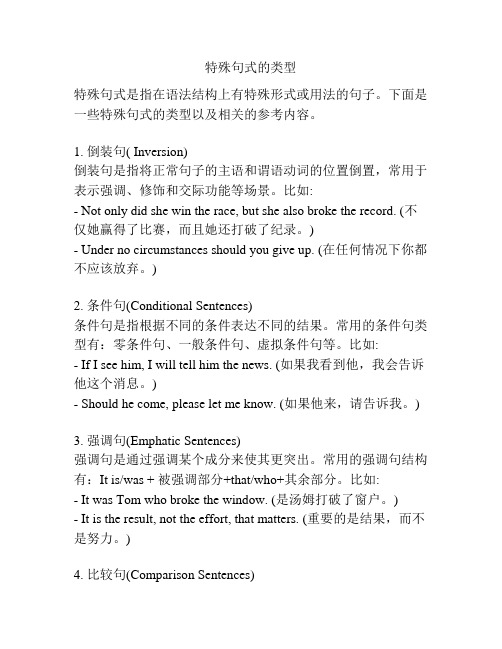
特殊句式的类型特殊句式是指在语法结构上有特殊形式或用法的句子。
下面是一些特殊句式的类型以及相关的参考内容。
1. 倒装句( Inversion)倒装句是指将正常句子的主语和谓语动词的位置倒置,常用于表示强调、修饰和交际功能等场景。
比如:- Not only did she win the race, but she also broke the record. (不仅她赢得了比赛,而且她还打破了纪录。
)- Under no circumstances should you give up. (在任何情况下你都不应该放弃。
)2. 条件句(Conditional Sentences)条件句是指根据不同的条件表达不同的结果。
常用的条件句类型有:零条件句、一般条件句、虚拟条件句等。
比如:- If I see him, I will tell him the news. (如果我看到他,我会告诉他这个消息。
)- Should he come, please let me know. (如果他来,请告诉我。
)3. 强调句(Emphatic Sentences)强调句是通过强调某个成分来使其更突出。
常用的强调句结构有:It is/was + 被强调部分+that/who+其余部分。
比如:- It was Tom who broke the window. (是汤姆打破了窗户。
)- It is the result, not the effort, that matters. (重要的是结果,而不是努力。
)4. 比较句(Comparison Sentences)比较句是用来比较两个对象或者描述相对关系的句子。
常用的比较句结构有:as+adj./adv. +as, not as+adj./adv.+as,more/less+adj./adv.+ than等。
比如:- He runs as fast as a cheetah. (他跑得像一只猎豹一样快。
特殊句式之——倒装
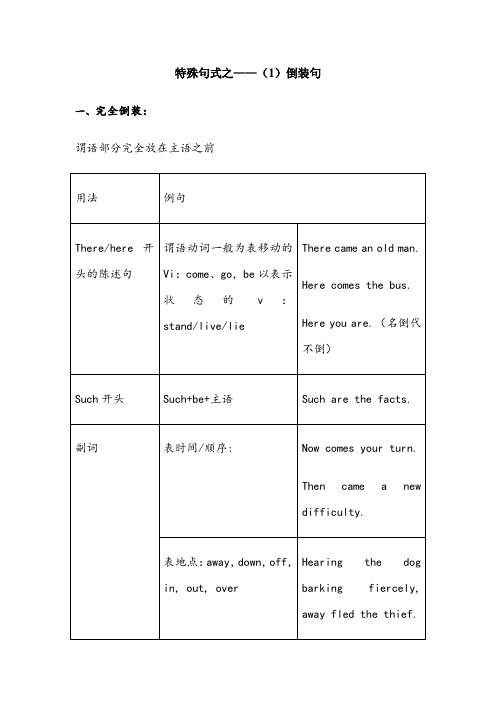
特殊句式之——(1)倒装句一、完全倒装:谓语部分完全放在主语之前练习:1.For a moment nothing happened. Then___all shouting together.A.voices had come voicesB. would come voices come2.Hearing the dog barking fiercely, away___.A.fleeing the thief fleeing the thiefB.the thief was fleeing the thief二、部分倒装只把be动词、助动词、情态动词提到主语前,叫部分倒装。
注意:so+sb/sth.+助动词某人、某物确实如此Eg. Helen likes music,so she does.练习:by increasing the number of doctors by 50 percent___ properly in this hospital.A.can be the patients treated the patients be treated C.the patients can be treated can be the patientsonce___ to Michael that he could one day become a top student in his class.it did occur occurred it occur3.——I reminded you not to forget the appointment.——____.A.So you didB. So I do not did you do I三、形式倒装(强调作用)将强调内容提前,主谓不倒装练习:____,his idea was accepted by all the people at the meeting.A.Strange as might it soundB.As it might sound strangeC.As strange it might soundD.Strange as it might sound四、倒装句综合练习题:1.(2014陕西)No sooner___stepped on the stage than the audience broke into thunderous applause.A.had Mo Yan Yan had Mo Yan Yan has2.(2016天津十二区县二联)So buried___ in doing her homework that she didn’t notice it got dark outside.A.was sheB. she was she did3.(2015天津十二区县一联)Only when our project has been approved of by the committee ____to carry it out.A.did we start started we start start4.(2015天津七校四月联考)Not until I had watched the football match between Brazil and Germany_____ to bed last night.A.I went had gone I gone I gone5.(2015天津南开中学高三五测)Little ____ about her own safety, thought she was in great danger herself.A.did Marry care did care does care Mary care6.(2015陕西质检二)It is all your fault. By no means____ left alone at home.A.should a two-year-old beB. a two-year-old should be be a two-year-old a two-year-old should7.(2016江苏苏锡常镇二模)____on mobile phones for storinginformation that people are unable to remember basic things.A.Such is the dependence dependence doesthey are dependent do they depend8.(2015天津红桥区一模)It is known that water is not an endless resource;_____can it be made once more, so we should save and protect it.A.so9.(2016天津高考压轴卷)Into the dark apartment_____,who was quite surprised when everyone shouted “Happy birthday!”A.did David walk did walk walked David10.(2014重庆市重庆一中高三下学期第一次月考,29)— Are the rest of our guests here—Not yet…. Look, there _____!A. come theyB. they cameC. do they comeD. they come11.(2014吉林省实验中学高三第一次模拟,29)______ you eat the correct food ____ be able to keep fit and stay healthy.A. Unless; will youB. Only if; you willC. Only if; will youD. Unless; you will12.(河南省中原名校2013届高三上学期期中联考,34)It's too messy in your room. Look, by the bed ____ a pile of dirty clothes.A. are liedB. layC. are lyingD. lies13.(2015天津,3)Only when Lily walked into the office______that she had left the contract at home.realized she realized has realized she realize 14.(2012天津, 6) Only after Mary read her composition the second time_____ the spelling mistake.A. did she noticeB. she noticedC. does she noticeD. she has noticed15.(2017和平区高三年级模拟考试)I’m my illness, I would have come and lent you a helping hand.Were it not B. If it were not it not been it has not been16.(2017十二区县高三年级模拟考试)Nowadays many teenagers often take their parents’ love for granted. Seldom____what they should return them when they are old.they think think they they17.(11福建)—It’s nice.Never before ____such a special drink!—I’m glad you like it.A. I have hadB. I hadC. have I hadD. had I18. (10江西)Not until he left his home to know how important the family was for him.A. did he beginB. had he begunC. he beganD. he has begun19. (10四川)We laugh at jokes, but seldom about how they work.A. we thinkB. think weC. we do thinkD. do we think20. (09重庆)Unsatisfied with the payment, he tookthe job just to get some work experience.A. though was heB. though he wasC. he was thoughD. was he though。
[荐]高考英语必考-特殊句式-倒装句-详解
![[荐]高考英语必考-特殊句式-倒装句-详解](https://img.taocdn.com/s3/m/614244671a37f111f0855b09.png)
【下载后获高清版】高考英语必考-特殊句式-倒装句-详解一、特殊句式全家福特殊句式这个大的考察方向,近几年,考察不多。
主要涉及到以下的考点。
一、感叹句(语法填空中考察,简单)二、强调结构(语法填空,书面表达中考察,简单)三、倒装句(语法填空,书面表达中考察,中等)四、省略句(基本能力,直接考察不多)五、祈使句(语法填空中考察某些结构)六、反义疑问句(直接考察不多)七、否定句(注意否定转移的现象,直接考察不多)二、倒装句英语的语序有两种。
1、英语句子的语序通常是主语在前,谓语在后,这种语序称作正常语序或自然语序。
2、倒装语序,有时出于语法或为达到某种修辞目的(强调、承上启下、平衡等)的需要,要把谓语动词放在主语前面,这种语序称作倒装( Inversion)语序。
倒装分为以下两种:A.完全倒装将谓语动词完全移至主语之前,是完全倒装( Full Inversion)Our teacher came in.( Our teacher是主语,came是谓语,in是状语;主语在前,谓语在后,是正常语序)In came our teacher.(整个谓语came放到了主语our teacher的前面,因此是完全倒装B.部分倒装如果只是把助动词或情态动词放在主语之前,称为部分倒装I will never forgive her.(I是主语, will forgive是谓语,her是宾语, never是状语。
)Never will I forgive her.(谓语部分will forgive中will放到了主语I的前面,而forgive还在主语后面,因此是部分倒装。
部分倒装的构成同一般疑问句的构成方法相似,)再如Only by working hard can you succeed.(部分倒装)Not a word did he say that day.(部分倒装)其中,一般疑问句也可以看作是一种倒装。
在there be句型中,be后的名词是句子的实义主语,be是句子的谓语,可以看作谓语动词放在主语的前面,因此,有语法家把there be句型也看作倒装句。
高中英语特殊句式-倒装句和强调句
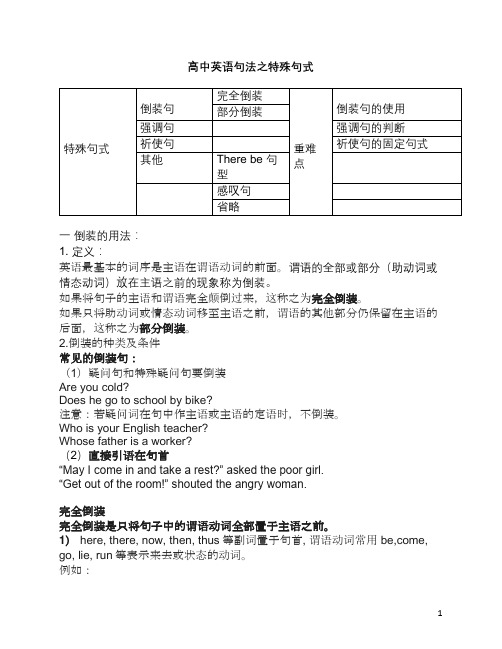
高中英语句法之特殊句式一倒装的用法:1. 定义:英语最基本的词序是主语在谓语动词的前面。
谓语的全部或部分(助动词或情态动词)放在主语之前的现象称为倒装。
如果将句子的主语和谓语完全颠倒过来,这称之为完全倒装。
如果只将助动词或情态动词移至主语之前,谓语的其他部分仍保留在主语的后面,这称之为部分倒装。
2.倒装的种类及条件常见的倒装句:(1)疑问句和特殊疑问句要倒装Are you cold?Does he go to school by bike?注意:若疑问词在句中作主语或主语的定语时,不倒装。
Who is your English teacher?Whose father is a worker?(2)直接引语在句首“May I come in and take a rest?” asked the poor girl.“Get out of the room!” shouted the angry woman.完全倒装完全倒装是只将句子中的谓语动词全部置于主语之前。
1) here, there, now, then, thus等副词置于句首, 谓语动词常用be,come, go, lie, run等表示来去或状态的动词。
例如:Here comes the bus! (=The bus is coming here! 用一般现在时表示正在进行的动作。
)There goes the bell! = The bell is ringing. 铃响了!Then came the chairman. 那时总裁来了。
Then came the hour we had been looking forward to.我们期盼的时候到了。
Here is your letter. 你的信。
2)表示运动方向的副词或地点状语置于句首,以out, in, up, down, off, away等副词开头,谓语动词是表示“移动”的go, come, leave等句子里。
英语:特殊句式-倒装句
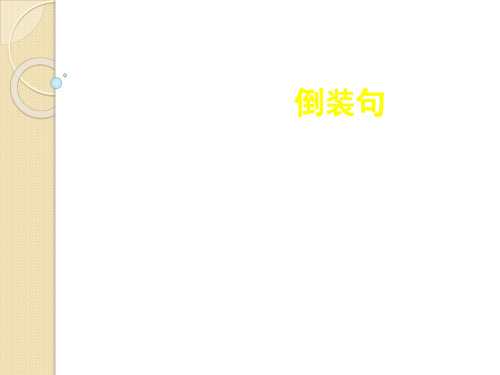
倒装句是高考考查的重点句式之一。 我们应当熟记完全倒装、部分倒装 及特殊倒装结构的有关句式。
下面,我们就以下几个方面来对倒 装句进行讨论。
一、倒装句的概念 二、倒装句的类型 三、倒装结构的用法及注意点 四、倒装句习题精选
一、倒装句的概念
在英语中,正常语序为主语在前,谓语在后。如果将谓 语的全部或一部分提到主语的前面,这种语序就叫倒装。
e.g. ① Isn’t it interesting! 真有趣! ② May you succeed! 祝您成功! ③ Long live the people! 人民万岁!
(8) 直接引语的一部分或全部位于句首,主句用完 全倒装
e.g. “ You’d better it at once”, said his mother. 注: 这种用法中常用谓语动词为say, think, ask, cry等。
(6)当句子中作表语的形容词、过去分词等较短,而主语相 对比较长,为了保持句子平衡而将表语前置时,句子的主谓 语也应完全倒装。 e.g. ① Gone are the days when they could do what they liked to the Chinese people. ② Present at the meeting were some scientists from China. (7)表示感叹、祝愿的句子
e.g. ① ——My room gets very cold at night. ——So does mine. ② I don’t like football. Neither does he.
注:如果句意表示肯定或附和 “的确如此”时,句子不用倒装 e.g. —— It’s hot. —— So it is.(的确如此)
特殊句式---倒装句 英语
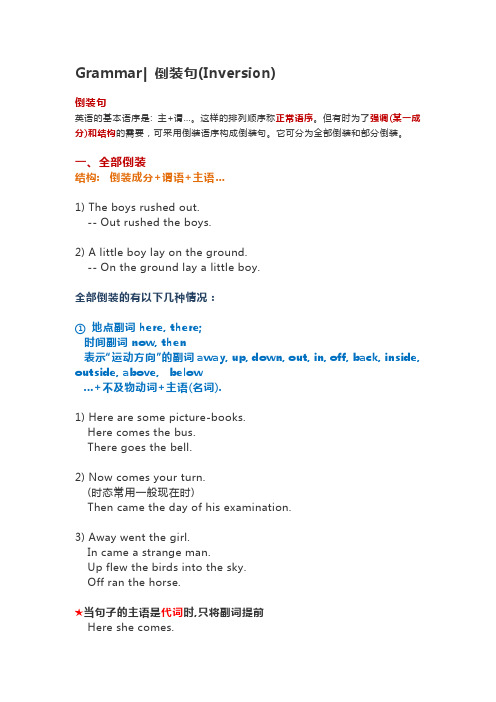
Grammar| 倒装句(Inversion)倒装句英语的基本语序是: 主+谓…。
这样的排列顺序称正常语序。
但有时为了强调(某一成分)和结构的需要,可采用倒装语序构成倒装句。
它可分为全部倒装和部分倒装。
一、全部倒装结构: 倒装成分+谓语+主语…1) The boys rushed out.-- Out rushed the boys.2) A little boy lay on the ground.-- On the ground lay a little boy.全部倒装的有以下几种情况:①地点副词here, there;时间副词now, then表示“运动方向”的副词away, up, down, out, in, off, back, inside, outside, above, below...+不及物动词+主语(名词).1) Here are some picture-books.Here comes the bus.There goes the bell.2) Now comes your turn.(时态常用一般现在时)Then came the day of his examination.3) Away went the girl.In came a strange man.Up flew the birds into the sky.Off ran the horse.★当句子的主语是代词时,只将副词提前Here she comes.Away she went.Out they ran.②表示地点的介词短语+不及物动词+主语(名词)1) Under the big tree sat some students.2) At the school gate stood a guard.3) On top of the hill stood a tower.On the wall hangs a large map.4) South of the city lies a big company.5) They arrived at the house, in front of which sat a little girl.★主语是代词时,不用倒装③表语(done, doing, adj, 介短) +连系动词+主语1) Gone was the days when Chinese people used "foreign oil".2) Present at the meeting were Professor Li and many other guests.3) Lying on the floor was a boy aged about seventeen.4) Seated on the ground are a group of young men playing cards.二、部分倒装结构: 倒装成分+助动词+主语+谓语…1) He was able to go to school only when the war was over.--Only when the war was over was he able to go to school.2) I will never forget it.-- Never will I forget it.部分倒装的有以下几种情况:①含有否定意义的词开头如: never, hardly, rarely, barely, seldom, little, few, nowhere, no sooner…(than), hardly/scarcely…(when)…,in no time(马上), at no time/ in no way/ in no case/ by no means(决不), not, not only…(but also)…, not until…, nothing, nobody等等1) Not a word did he say at the meeting.2) Never have I heard such a thing.Nothing did I see.3) Little did she say in the discussion.4) Hardly had he seen me when he ran away.5) Not only is he a scientist, but also he is a painter.6) Not until I received his letter did I learn anything about it.7) In no time will he come back.8) In no way should we forget history.★not 否定主语或not only…but also…连接两个主语时不用倒装1) Not a word was said.2) Not only you but also I will go there.3) Little work was done yesterday.②用于only所修饰的副词,介短, 状语从句开头时.1) Only in this way can we learn English well.2) Only then did I realize I made such a big mistake.3) Only by seizing every minute can we finish the work on time.4) Only when he got home did he know what happened to her.★但only 修饰主语时不用倒装1) Only some boys passed the math exam.2) Only Dr. Yang can save his life.③so/ neither/ nor+助动词+主语…表示甲…, 乙“也”/ “也不...”1) He went to college last year, (and) so did I.2) He has been to Qingdao, so have I.3) He could not do it, neither/ nor could I.4) After that we never saw her again, nor did we hear from her.★在so +主+助动, 表示同意对方的说法,意为“的确如此”.--Jim does well in Chinese.--so he does.--It is very hot today.-- Yes, so it is.★Neither…nor…连接的两个句子都要倒装;not only…but also…连接的两个句子时,not only后面的句子要倒装1) Neither has he called on her, nor will he do so.2) Not only shall we learn from books, but also we should learn form practice.④在so/such …(that…)结构中.so +adj/adv 或such (a/an) adj 名词+助动词+主语…1) The book is so interesting that all the children like it.--So interesting is the book that all the children like it.2) He spoke so loudly that everyone could hear him clearly.--So loudly did he speak that everyone could hear him clearly.3) It is such fine weather that we decide to go for an outing.--Such fine weather is it that we decide to go for an outing.⑤某些频度副词(often, many a time, always, now and then, every two hours等) 放在句首时.1) Often did we warn them not to do so.2) Always will we remember the importance of the meeting.3) Many a time has he given us good advice.4) Now and then does Jones go to the cinema.★其实,特殊疑问句也属于部分倒装。
英语倒装句12种类型
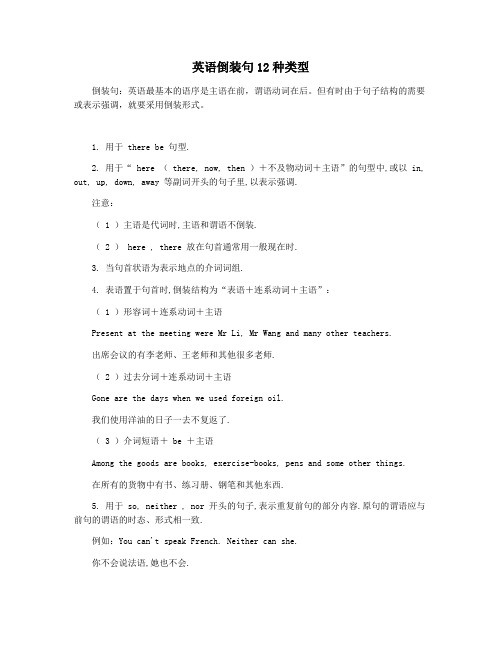
英语倒装句12种类型倒装句:英语最基本的语序是主语在前,谓语动词在后。
但有时由于句子结构的需要或表示强调,就要采用倒装形式。
1. 用于 there be 句型.2. 用于“ here ( there, now, then )+不及物动词+主语”的句型中,或以 in, out, up, down, away 等副词开头的句子里,以表示强调.注意:( 1 )主语是代词时,主语和谓语不倒装.( 2 ) here , there 放在句首通常用一般现在时.3. 当句首状语为表示地点的介词词组.4. 表语置于句首时,倒装结构为“表语+连系动词+主语”:( 1 )形容词+连系动词+主语Present at the meeting were Mr Li, Mr Wang and many other teachers.出席会议的有李老师、王老师和其他很多老师.( 2 )过去分词+连系动词+主语Gone are the days when we used foreign oil.我们使用洋油的日子一去不复返了.( 3 )介词短语+ be +主语Among the goods are books, exercise-books, pens and some other things.在所有的货物中有书、练习册、钢笔和其他东西.5. 用于 so, neither , nor 开头的句子,表示重复前句的部分内容.原句的谓语应与前句的谓语的时态、形式相一致.例如:You can't speak French. Neither can she.你不会说法语,她也不会.6. 为了保持句子平衡,或为了强调表语或状语,或是上下文紧密衔接时.例如: They arrived at a small village, in front of which was a big river.他们来到一个小村庄,村庄前面是条大河.1. 否定副词位于句首时的倒装在正式文体中,never, seldom, rarely, little, hardly, scarcely, no sooner, no longer, nowhere 等含有否定意义的副词若位于句首,则其后要用部分倒装:I shall never forgive him. / Never shall I forgive him. 我永远不会宽恕他。
高考英语二轮复习特殊句式考点讲解含解析
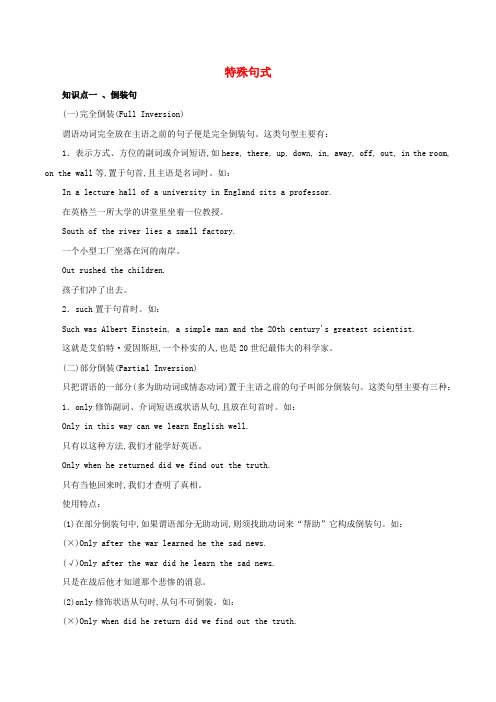
特殊句式知识点一、倒装句(一)完全倒装(Full Inversion)谓语动词完全放在主语之前的句子便是完全倒装句。
这类句型主要有:1.表示方式、方位的副词或介词短语,如here, there, up, down, in, away, off, out, in the room, on the wall等,置于句首,且主语是名词时。
如:In a lecture hall of a university in England sits a professor.在英格兰一所大学的讲堂里坐着一位教授。
South of the river lies a small factory.一个小型工厂坐落在河的南岸。
Out rushed the children.孩子们冲了出去。
2.such置于句首时。
如:Such was Albert Einstein, a simple man and the 20th century's greatest scientist.这就是艾伯特·爱因斯坦,一个朴实的人,也是20世纪最伟大的科学家。
(二)部分倒装(Partial Inversion)只把谓语的一部分(多为助动词或情态动词)置于主语之前的句子叫部分倒装句。
这类句型主要有三种:1.only修饰副词、介词短语或状语从句,且放在句首时。
如:Only in this way can we learn English well.只有以这种方法,我们才能学好英语。
Only when he returned did we find out the truth.只有当他回来时,我们才查明了真相。
使用特点:(1)在部分倒装句中,如果谓语部分无助动词,则须找助动词来“帮助”它构成倒装句。
如:(×)Only after the war learned he the sad news.(√)Only after the war did he learn the sad news.只是在战后他才知道那个悲惨的消息。
高考英语语法词汇专项突破:02特殊句式之倒装句考点突破[001]
![高考英语语法词汇专项突破:02特殊句式之倒装句考点突破[001]](https://img.taocdn.com/s3/m/692147eb68dc5022aaea998fcc22bcd127ff4267.png)
高考英语语法词汇专项突破:02特殊句式之倒装句考点突破考情速递倒装句属于典型的特殊句式,其主谓位置颠倒。
依据其倒装形式又可分为部分倒装和全部倒装两种形式,该句式打破了考生对于句式的惯性思维。
考点主要集中在:全部倒装与部分倒装区分;状语从句中的倒装;only和否定副词或介词短语置于句首的倒装;虚拟语气中的部分倒装。
本文依据历年高考对倒装结构的考查整理出十一个考点,以飨考生。
考点透视一、完全倒装三大考点完全倒装一般具有以下两个条件:①谓语动词是单个(即不带情态动词、助动词或be)的不及物动词,且只限于一般现在时或一般过去时; ①主语只能是名词。
分以下三种状况:考点一、时间、地点等副词开头引起的全部倒装以地点副词here, there,时间副词now, then,以及thus, hence开头,后面的动词是be, come, exist, fall, follow, go, lie, live, remain, seem, stand等,而主语又是名词时,构成完全倒装句。
如:There goes the bell! = The bell is ringing. 铃响了!Once upon a time,there lived an old man who had two beautiful daughters.从前,有一个老人,他有两个秀丽的女儿。
Then came the hour we had been looking forward to. 我们期盼的时候到了。
Thus comes the modern civilization of industry, agriculture and science.现代工业文明、农业和科学就是因此进展的。
【典题】没有什么比获准参与太空旅行项目更令人兴奋的了。
(than)(XXXX上海卷.翻译.3)答案与解析:There is nothing more exciting than being allowed to take part in the space travel programme. 据句意看出属于there be句型,是倒装句,主语是nothing,由than提示看出用more…than…结构的比较级。
高中英语语法专讲 特殊句式之倒装句Inversion

高中英语语法专讲特殊句式之倒装句Inversion 英语句子通常有两种语序:一种主语在前,谓语在后,称为正常语序,另一种谓语在前,主语在后,称为倒装语序。
之所以出现倒装,一方面是因为语法结构的需要,另一方面为了强调或修饰,有时两种原因兼有之。
倒装句分为全部倒装和部分倒装。
另外,英语句子的倒装一是由于语法结构的需要而进行的倒装,二是由于修辞的需要而进行的倒装。
前一种情况称之为语法倒装 ,倒装是必须的,否则就会出现语法错误;后一种情况称之为修辞倒装 ,倒装是选择性的,倒装与否只会产生表达效果上的差异。
一、【全部倒装】把整个谓语部分放在主语之前。
注意:谓语动词的数要与后面的主语保持一致。
1、用于地点副词here, there,方位副词out, in, up, down及时间副词now, then等开头,谓语动词为be, stand, lie, come, go, fall等的句子里,以示强调。
【语法倒装】There goes the bell. Look! Here comes the bus.这种倒装要求:主语必须是名词。
而当主语是代词时,主语和谓语语序不变。
Here it is. Here you are. Away he went. Here we go.注意:这类倒装句式一般只用一般现在时和一般过去时时态。
Here comes Miss Young. Out rushed the boys.[小练]汉翻英1)紧接着了三天大雨。
Then followed three days of heavy rain.2)我们期盼已久的时刻来了!Now comes the hour we have been looking forward to.2、当表示地点的介词短语放句首时。
注意:谓语多为be, lie, sit, stand, come, walk等不及物动词且这类倒装句式一般只用一般现在时和一般过去时时态。
初高中衔接英语中的特殊句式之倒装句课件

2.常考的引起部分倒装的条件:
(7) “一...就...”no sooner...than.../hardly...when...结构的倒装。
改写:As soon as she rushed out of the house, tears of regret rolled down her cheek. 她一冲出家门,悔恨的泪水就顺着脸颊滚落下来。
2.常考的引起部分倒装的条件:
(8) “也(不)是”的倒装 ”so/neither+助动词/情态动词/be动词 +主语(代词)” 正常语序: He doesn’t like eating apples. I didn’t like eating apples, either. 不喜欢吃苹果。我也不喜欢。 倒装语序:He doesn’t like eating apples. Neither do I.
No sooner had I arrived at home than the phone rang. 6.如果我有钱,我就买下它。
Had I mony, I would buy it.
改写:We can do it better only in this way.只有这样我们才能做的更好。
Only in this way can we do it better.
He admitted his mistake only after the fault was pointed out. 只有错误被指出后,他承认了自己的错误。 Only after the fault was pointed out, did he admit his mistake.
英语特殊句式语法

英语特殊句式语法一、概说英语语法中的特殊句式包括省略句、倒装句、强调句和虚拟语气等。
这些句式在英语中有着特殊的表达效果和意义,是英语语言的重要组成部分。
理解和掌握这些特殊句式,对于提高英语阅读、写作和口语表达能力至关重要。
二、省略句省略句是指在英语句子中,为了使语言更加简洁明了,省略掉某些成分的句子。
省略句可以是主语的省略、谓语的省略、宾语的省略等。
例如:It is raining heavily. (省略主语)The train leaves at 7:00. (省略谓语)I like reading books. (省略宾语)三、倒装句倒装句是指英语句子中的语序与常规语序相反,以强调某些词语或表达某种特殊意义。
倒装句可以分为全部倒装和部分倒装。
例如:Here comes the bus. (全部倒装)Only in this way can we solve the problem. (部分倒装)四、强调句强调句是为了突出某个词语或表达某种特殊意义而采用的一种句式。
强调句可以通过改变语序、使用强调词或使用强调结构来表达。
例如:It was he who found the solution to the problem. (使用强调词)It is on this issue that we need to focus our attention. (使用强调结构)五、虚拟语气虚拟语气是一种表示假设、想象或愿望的语气,与实际情况相反。
虚拟语气可以分为三种:与现在事实相反、与过去事实相反和与将来事实相反。
例如:If I were you, I would choose this option. (与现在事实相反)If he had known the answer, he would have given it to you. (与过去事实相反)If it were to rain tomorrow, we would cancel the picnic. (与将来事实相反)六、总结英语特殊句式语法是英语语言的重要组成部分,理解和掌握这些特殊句式对于提高英语阅读、写作和口语表达能力至关重要。
英语特殊句式语法

英语特殊句式语法英语语法中存在一些特殊的句式结构,它们具有独特的语法规则和用法。
在本文中,我们将介绍一些常见的英语特殊句式,并通过示例来解释它们的用法。
一、倒装句倒装句是英语中常见的特殊句式之一,它采取了主语和谓语动词的位置颠倒。
倒装句的用法多种多样,下面是一些常见的情况:1. 完全倒装:当句子以表示地点状态的副词(如here, there, now, then等)开头时,需要完全倒装。
例如:Here comes the bus.There goes my hat.2. 部分倒装:在某些特定的条件下,主语和谓语动词的位置需要部分颠倒。
a. 在用于表示否定的副词或短语(如never, seldom, hardly, not until 等)开头的句子中,需要将助动词或情态动词与主语颠倒。
例如:Never have I seen such a beautiful sunset.Not until she left did I realize how much I loved her.b. 在以表示条件的状语从句(如if, unless, whether等)开头的句子中,需将助动词和主语颠倒。
例如:If only I had more time, I would travel around the world.Whether it rains or not, we will go camping.二、虚拟语气虚拟语气是英语中常见的特殊句式之一,用于表示与事实相反、假设或愿望等情况。
以下是虚拟语气的几种常见形式:1. 虚拟条件句:用于表示与事实相反的假设情况,包括类型1、类型2和类型3三种类型。
a. 类型1:表示真实可能发生的假设例如:If she studies hard, she will pass the exam.b. 类型2:表示与事实相反,但在理论上有可能实现的假设例如:If I were you, I would quit that job.c. 类型3:表示与过去事实相反的假设例如:If I had studied harder, I would have passed the exam.2. 虚拟表达愿望例如:I wish I could play the piano like a professional.3. 虚拟表达建议、命令等例如:The teacher suggested that they should review the material again.三、强调句强调句是一种特殊的句式,它通过强调句子中的某个成分来表达特殊的意义。
高中英语语法:特殊句式 之倒装句
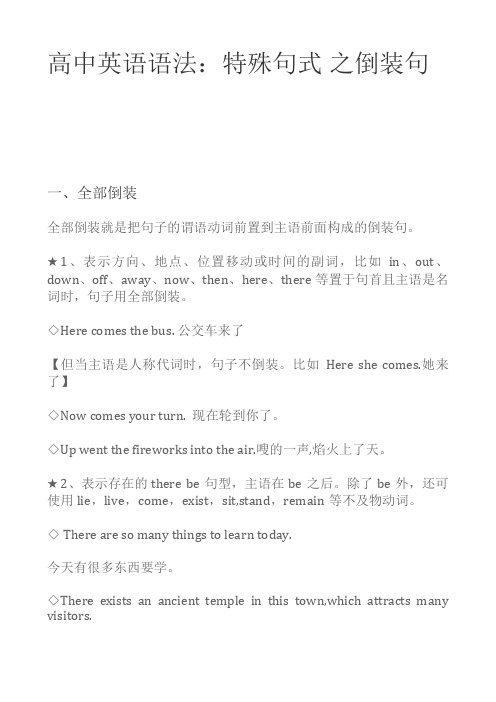
高中英语语法:特殊句式之倒装句一、全部倒装全部倒装就是把句子的谓语动词前置到主语前面构成的倒装句。
★1、表示方向、地点、位置移动或时间的副词,比如in、out、down、off、away、now、then、here、there等置于句首且主语是名词时,句子用全部倒装。
◇Here comes the bus. 公交车来了【但当主语是人称代词时,句子不倒装。
比如Here she comes.她来了】◇Now comes your turn. 现在轮到你了。
◇Up went the fireworks into the air.嗖的一声,焰火上了天。
★2、表示存在的there be句型,主语在be之后。
除了be外,还可使用lie,live,come,exist,sit,stand,remain等不及物动词。
◇ There are so many things to learn today.今天有很多东西要学。
◇There exists an ancient temple in this town,which attracts many visitors.这个镇上有一个古代庙宇,吸引着许多游客。
3、介词短语放在句首作状语,谓语动词是lie, stand , sit ,exist , stretch , come等或系动词be,主语是名词时。
◇At the foot of the mountain lies a clean stream.山脚下有一条清澈的小溪。
4、代词such放在句首,句子的谓语动词是be。
◇Such is what he wanted.这就是他想要的。
5、为了保持句子平衡,使上下文紧密街接,常将表语和状语放在句首,引起主语和谓语的倒装。
◇Gone are the days when we used foreign oil.我们用“洋油”的时代一去不复返了6、现在分词、过去分词、形容词、副词等有时可移到句首,来对动作或状态加以强调。
特殊句式讲解
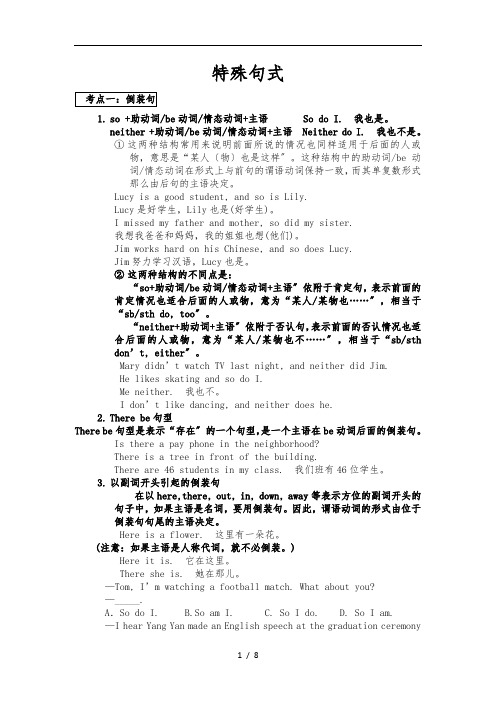
特殊句式1.so +助动词/be动词/情态动词+主语 So do I. 我也是。
neither +助动词/be动词/情态动词+主语 Neither do I. 我也不是。
①这两种结构常用来说明前面所说的情况也同样适用于后面的人或物,意思是“某人〔物〕也是这样〞。
这种结构中的助动词/be动词/情态动词在形式上与前句的谓语动词保持一致,而其单复数形式那么由后句的主语决定。
Lucy is a good student, and so is Lily.Lucy是好学生,Lily也是(好学生)。
I missed my father and mother, so did my sister.我想我爸爸和妈妈,我的姐姐也想(他们)。
Jim works hard on his Chinese, and so does Lucy.Jim努力学习汉语,Lucy也是。
②这两种结构的不同点是:“so+助动词/be动词/情态动词+主语〞依附于肯定句,表示前面的肯定情况也适合后面的人或物,意为“某人/某物也……〞,相当于“sb/sth do, too〞。
“neither+助动词+主语〞依附于否认句,表示前面的否认情况也适合后面的人或物,意为“某人/某物也不……〞,相当于“sb/sthdon’t, either〞。
Mary didn’t watch TV last night, and neither did Jim.He likes skating and so do I.Me neither. 我也不。
I don’t like dancing, and neither does he.2.There be句型There be句型是表示“存在〞的一个句型,是一个主语在be动词后面的倒装句。
Is there a pay phone in the neighborhood?There is a tree in front of the building.There are 46 students in my class. 我们班有46位学生。
- 1、下载文档前请自行甄别文档内容的完整性,平台不提供额外的编辑、内容补充、找答案等附加服务。
- 2、"仅部分预览"的文档,不可在线预览部分如存在完整性等问题,可反馈申请退款(可完整预览的文档不适用该条件!)。
- 3、如文档侵犯您的权益,请联系客服反馈,我们会尽快为您处理(人工客服工作时间:9:00-18:30)。
注:1.当only 后面跟的状语是一个从句时,从句不倒装, 1.当 后面跟的状语是一个从句时,从句不倒装,
主句用部分倒装。 主句用部分倒装。 e.g. Only when you have grown up can you understand your parents. 放在句首,但不修饰状语时,用正常语序。 2.only 放在句首,但不修饰状语时,用正常语序。 e.g. Only I can go there.
2.部分倒装(只将谓语动词的一部分,如助动词, 2.部分倒装(只将谓语动词的一部分,如助动词,连系动词 部分倒装 be,情态动词等放在句首 情态动词等放在句首) be,情态动词等放在句首) (1)一般疑问句句式(主谓宾结构) (1)一般疑问句句式(主谓宾结构) 一般疑问句句式 e.g. Did he tell you the news yesterday? (2)特殊疑问句句型(主谓宾结构) (2)特殊疑问句句型(主谓宾结构) 特殊疑问句句型 can’ e.g. Why can’t I smoke here? (3)否定词或半否定词, (3)否定词或半否定词, 如never, seldom, hardly, rarely, 否定词或半否定词 not, nor, neither, little, scarcely, not until, sooner(…than), nowhere, not only, nothing, no sooner( than), at no time, by no means, on no condition, in no case等位于句首时,用部分倒装。 case等位于句首时,用部分倒装。 等位于句首时
(4)表示地点、方向等的介词短语位于句首, 表示地点、方向等的介词短语位于句首, 且主语为名词时, 且主语为名词时,用完全倒装 e.g. ① Near the river was a pine tree. ②In the house lives an old man . 这个句型中谓语动词大多为be, 注:这个句型中谓语动词大多为be, sit, live, lie, stand, rise, go , come 等。 当副词here, (5)当副词here, there, up, down, out, off, away等位于句首 等位于句首, back, in , now, then, away等位于句首, 且主语为名词时,用完全倒装。 且主语为名词时,用完全倒装。 e.g. ① There goes the bell. ② Now comes the bus.
完全倒装是指当某一特定的内容出现在句首时, 完全倒装是指当某一特定的内容出现在句首时,将谓语 动词直接提前放在主语之前构成的倒装句型。 动词直接提前放在主语之前构成的倒装句型。 e.g. (1) In came the boy. (2) Away flew the bird.
注:1.完全倒装句中的主语一般是名词,而不是代词。 1.完全倒装句中的主语一般是名词,而不是代词。 完全倒装句中的主语一般是名词 2.完全倒装句通常只用一般现在时和一般过去时 完全倒装句通常只用一般现在时和一般过去时。 2.完全倒装句通常只用一般现在时和一般过去时。 village.(完全倒装) e.g. (1) At the foot of the mountain lies a village.(完全倒装) 名词) 一般现在时) (名词) (一般现在时) 不倒装) (2) Here you are. (不倒装) 代词) (代词)
1. The children rushed out. (正常语序) 正常语序) children. 倒装语序) 2. Out rushed the children. (倒装语序) 3. Never shall I do the same thing again. (倒装语序)
二、倒装句的类型 1.完全倒装 1.完全倒装
e.g. ① Never have I seen such a performance. ② Little does he realize the danger he is in. ③ Not only will help be given to the people to find jobs, but also medical treatment will be provided for the people who need it. 不但会帮助人们找工作,还会为那些需要的人提供医疗。 不但会帮助人们找工作,还会为那些需要的人提供医疗。 (Scarcely)…when, sooner… than, 注:1. Hardly (Scarcely) when, no sooner only…but also等引导两个分句时 等引导两个分句时, not only but also等引导两个分句时, 前一个分句用部分倒装,后一个分句不倒装。 前一个分句用部分倒装,后一个分句不倒装。 e.g. Hardly had he begun to speak when his father stopped him. 2.neither…nor引导两个分句时,两个分句都要倒装。 nor引导两个分句时 2.neither nor引导两个分句时,两个分句都要倒装。 she. e.g. Neither do I know it, nor does she. 放在句首, until后面跟的是一个从句 3.not until …放在句首,如果until后面跟的是一个从句, 放在句首 如果until后面跟的是一个从句, 从句不要用倒装,主句要用部分倒装。 从句不要用倒装,主句要用部分倒装。 e.g. Not until his father came back did he begin to to do his homework.
为使上下文紧密衔接, (9) 为使上下文紧密衔接,可用完全倒装
e.g. We saw a house over there, in front of which stood an apple tree. 我们看见那边有一所房子, 房子前边有一棵苹果树。 我们看见那边有一所房子, 房子前边有一棵苹果树。
2.部分倒装 2.部分倒装
部分倒装是指当某一特定内容出现在句首时, 部分倒装是指当某一特定内容出现在句首时, 不能将谓语动词直接提至主语前面, 不能将谓语动词直接提至主语前面,而须将谓语的 一部分( 助动词、连系动词be 情态动词等 be、 一部分(如助动词、连系动词be、情态动词等)放 在主语前面。 在主语前面。
(1)一般疑问句句型(主系表结构) 一般疑问句句型(主系表结构) e.g. Is Mary a teacher? 特殊疑问句句型(主系表结构) (2) 特殊疑问句句型(主系表结构) e.g. Who is that man ? 句型( be之外 能与there 之外, (3) There be 句型(除be之外,能与there 连用的动词还有 stand等 seem, exist, happen, appear , live, stand等) e.g. ① There are 50 students in the class. ② There stands a tall tree in front of the house.
so(也 nor(也不 放在句首时, 也不) (5) so(也), neither, nor(也不)放在句首时, 用部分倒装
e.g. ① ——My room gets very cold at night. My ——So does mine. So don’ ② I don’t like football. Neither does he. he. 的确如此” 注:如果句意表示肯定或附和 “的确如此”时,句子不用倒装 It’ e.g. —— It’s hot. —— So it is.(的确如此) is.(的确如此) .(的确如此
only修饰副词 介词短语或状语位于句首时, 修饰副词、 (4) only修饰副词、介词短语或状语位于句首时, 用部分倒装
e.g. ① Only in this way can you help her. ② Only then did we realize that the man was blind.
特殊句式— 特殊句式 倒装句
倒装句是高考考查的重点句式之一。 倒装句是高考考查的重点句式之一。 是高考考查的重点句式之一 我们应当熟记完全倒装、 我们应当熟记完全倒装、部分倒装 及特殊倒装结构的有关句式。 及特殊倒装结构的有关句式。 下面, 下面,我们就以下几个方面来对倒 装句进行讨论。 装句进行讨论。
3.特殊倒装结构 3.特殊倒装结构 (1) as(尽管)引导让步状语从句时,通常将句中 as(尽管)引导让步状语从句时, 状语、表语部分或动词提前,如果表语是名词, 状语、表语部分或动词提前,如果表语是名词,其前 不加冠词。 不加冠词。
e.g. ①Terrible as the storm was, we continued our way. 尽管暴风雪很大,但我们还是继续赶路。 尽管暴风雪很大,但我们还是继续赶路。 ②Child as he was, he was able to stand on his own feet. 尽管他是个孩子,他已经能够独立地生活了。 尽管他是个孩子,他已经能够独立地生活了。 couldn’ ③Try as she might, Carolina couldn’t get the door open. 尽管卡罗琳娜尝试了,但还是打不开门。 尽管卡罗琳娜尝试了,但还是打不开门。 注:1.这种句型中,as后面仍然跟陈述句语序,不用倒装。 1.这种句型中,as后面仍然跟陈述句语序,不用倒装。 这种句型中 后面仍然跟陈述句语序 2.表语部分如有冠词,要将其省略。 2.表语部分如有冠词,要将其省略。 表语部分如有冠词
(6)当句子中作表语的形容词、过去分词等较短, (6)当句子中作表语的形容词、过去分词等较短,而主语相 当句子中作表语的形容词 对比较长,为了保持句子平衡而将表语前置时, 对比较长,为了保持句子平衡而将表语前置时,句子的主谓 语也应完全倒装。 语也应完全倒装。 e.g. ① Gone are the days when they could do what they liked to the Chinese people. ② Present at the meeting were some scientists from China. (7)表示感叹、祝愿的句子 (7)表示感叹、 表示感叹 Isn’ 真有趣! e.g. ① Isn’t it interesting! 真有趣! 祝您成功! ② May you succeed! 祝您成功! 人民万岁! ③ Long live the people! 人民万岁!
